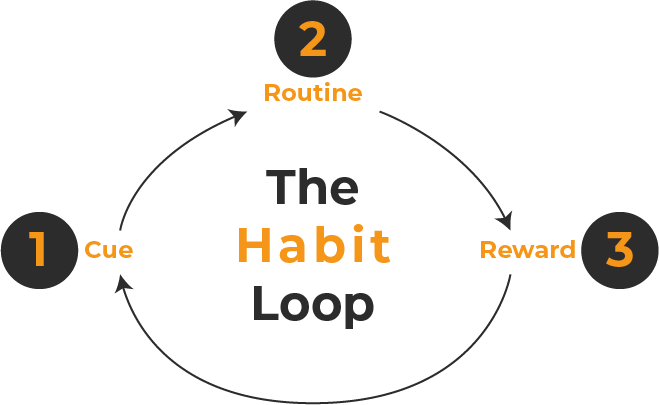How to Start New Habits and Stop Old Ones

Habits are behavior that has become reflexive over time and often are a triggered response. It’s been found that habits start with psychological behavior called a “habit loop” which takes place in three parts. The first part is the trigger which causes us to begin to form the habit behavior. Then comes the continued routine of the habit, and finally the reward we feel from it. So how do we break away from the bad ones and create new ones?
Identify triggers
The best way to break a habit is to identify what triggers your habit. When you recognize your habits, you can break down what factors around you may be causing you to do the behavior. You’ll need to focus on why you want to change your habits. A study found that it may be easier to change your habits when you actually want change that is beneficial or valuable to you. With this, think about your habits and what that change would mean for you. It’s helpful to write this down or place reminders in areas you spend most of your time in as it keeps it fresh in your mind – and serves as a reminder if you find yourself falling back into old habits.
Replacing old habits with new ones
Another method you can use is to identify the habit you wish to change and replace it with a new habit. Once you are repeating a new behavior, you will begin to feel compelled to follow a new routine. The rewards of the new routine will follow shortly after. For example, if you wanted to become more active and decided to take a 30 min walk each day, you will eventually feel a boost in endurance, lose weight, and gain more mental clarity.
Practice your habit daily
If you’re wanting to start a new habit, the best way to do this is to do it every day. A study published in the European Journal of Social Psychology found that the amount of time for a task to become an automatic behavior ranged from 18- 254 days with the average being 66 days. In short, it takes quite a bit of time to form a habit but the more you do it you are more likely to stick to it.
However, there are some things you can do to make it a bit easier on yourself. First, it’s important that you reward yourself. However, depending on your new habit the rewards may take longer to reap. With this in mind, another critical factor to consider is to start small, and try easier habits. We are more likely to form new habits when we clear the obstacles that stand in our way. For example, if you’re wanting to go to the gym more, packing your gym bag and leaving it by the door makes you more inclined to go.
Changing habits and creating new ones is not an easy process – it calls for time and dedication to the desired change. The more you are educated on the process of habit making and how habit formation works, the more equipped you will be to tackle the process. It’s vital you take it easy on yourself during that process, and the more successful you will be.
Schedule a FREE Consultation
We believe in an integrative and holistic approach to help you make the changes you want. Contact us now to schedule an appointment or to request a 20 minute free phone consultation. During this session, you will be invited to share your story and ask any questions you may have.
Recent Articles
Identifying Different Parenting Styles
Much like everything in life, there are differences in the way people parent their children. People often want to know…
Signs Someone You Love May Be Hiding Depression
Depression can be scary for many people. Depression can make individuals feel as though they are losing control over their…
Fighting the Good Fight with Couples Therapy
Tension and conflict are normal and even healthy parts of any relationship. Sometimes, tension and conflict work out by itself.…
What Is Family Therapy?
In any family, it is normal to have a certain level of conflict. In fact, conflict might even be healthy…





